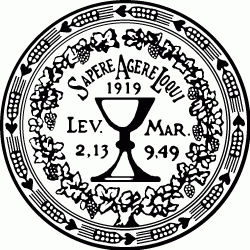
|
Think – Act – Speak: Theology as Salt Some reflections on the emblem of the Faculty |
|
Pavel Filipi |
When the Prague Protestant Theological Faculty was established in 1919, its founders were faced with one small task, in addition to many more major ones: how to represent symbolically the traditions they were building on and the goals they were aiming at. They therefore designed a new emblem, which is still used today as the seal of the Faculty.
How is its symbolism to be understood?
In the centre of a circular design we see a chalice. This symbolises clearly enough the link with the heritage of the Czech Reformation, especially with the Hussite Reformation, which reintroduced reception of the chalice by laypeople at celebrations of the Lord’s Supper. In 1417 the entire Theological Faculty of Prague University called for communion under both kinds, taking the side of the revolution and thus risking its very existence: within a year the Council of Constance had withdrawn its license to teach. In choosing this symbol, the new Faculty demonstrated that it was committed to the chalice (with all this might entail) just as the Hussites had been, and that it rejected any kind of clericalism, including theological clericalism.
In the top half of the round design we can read the Latin words: SAPERE, AGERE, LOQUI, which means in English: think, act, speak. The historical origin of this motto goes back to Jan Amos Komenský (Comenius), the last bishop of the old Unity of Brethren. The choice of these terms and the way they are linked together can be understood without any further explanation. The theology the new Faculty wants to cultivate should be scholarly, requiring a rigorous intellectual discipline; it should be practical, leading on to action; and finally, it should be based on dialogue, rejecting all other means of putting across the truth apart from the Word. The order in which the terms are placed is perhaps surprising, with “speak” in third place, forming the climax of the motto. But this surprise disappears when we remember the tremendous importance the Czech Reformation attached to the freedom of God’s word. Freely proclaiming the liberating Word is in itself “the freest of actions” (actus liberimus omnium) and is capable of freeing Christianity from its Babylonian captivity. Again and again, even in times of the greatest oppression, Czech Protestant Christians have experienced the fact that “God’s Word is not chained” (2 Tim. 2:9), and that on the contrary it creates a space for free speech around itself. Following on from this experience and tradition, the Faculty founders committed themselves to establishing the Faculty as a refuge of free speech, rooted in the freedom of God’s word.
In the central part of the emblem, to the left and right of the chalice, is a conundrum in the form of two references to Scripture – Leviticus 2:13 and Mark 9:49. In both passages the word “salt” (Latin sal) is to be found. The connection between the motto and the Scripture quotations becomes clear when we realize that the initial letters of the three words in the motto (Sapere, Agere, Loqui) together form the Latin word SAL.
But what have theology and a theological faculty to do with salt? What led our predecessors who chose the design of the emblem to select these two passages from among the many places in the Bible where salt is mentioned? Today we can only guess at the exegesis they had in mind. We can however be reasonably certain that the version of the quotation from Mark that they had in front of them was one that is not perhaps borne out by the original manuscripts, but is often found in Reformed translations of the Bible. According to this version, Jesus' words were: “Every sacrifice will be salted with salt.” We are struck by the fact that in both passages the word “salt” is closely linked with the concept of sacrificial offering. Leviticus 2:13 enjoins: “You shall season all your grain offerings with salt. Do not leave the salt of the covenant of your God out of your grain offerings. Add salt to all your offerings.”
Theology as a reference to sacrifice? Did the founders of the Faculty want to emphasize that the Faculty should continue to direct its attention to the core of the Christian message – Christ’s sacrifice on the cross? Maybe. But perhaps they had something else in mind when they designed the emblem. For in both quotations salt is referred to as an additional ingredient that becomes dissolved and dispersed throughout the sacrificial offering. And this self-dissolution and self-dispersal is one of the basic functions of theology. By calling into question its own instincts of self-preservation it commits the whole of its thinking, acting and speaking to the service of both Christian and civic communities, warns and protects them against the corruption of egoism, and encourages them to serve selflessly those who are considered to be of least importance in this world. In this way theology can make its contribution towards ensuring that the human family does not lose the dimension of self-denial and voluntary renunciation, without which neither a life of human dignity nor peaceful coexistence are possible.
Charles University
Protestant Theological Faculty
Černá 646/9
110 00 Prague 1
Czech Republic
Dean's Office:
(+420) 221 988 216
Office for International Relations:
(+420) 221 988 211